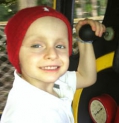Identifying Ewing Sarcoma Developmental Vulnerabilities

Ewing sarcoma (ES) is a malignant bone and soft-tissue tumor that affects children, adolescents, and young adults, with an extremely poor prognosis for patients with metastatic or relapsed disease. Ewing sarcoma occurs when two pieces of different DNA chromosomes abnormally break and fuse together, creating a powerful cancer gene within the cell known as 'EWSR1-FLI1.' We know very little about what type of cell in the body gives rise to Ewing sarcoma, and there have not been effective animal genetic models of the disease to test new treatments for children with that disease. A better understanding of ES's developmental origin(s) can shed light on the lineage-specific dependency of tumor cells on developmental regulators. To understand the disease pathogenesis and to identify cancer cell vulnerabilities I developed a novel zebrafish model of Ewing sarcoma. This model enables me to observe the behavior of cancer cells labeled with green fluorescent protein during tumor initiation and progression throughout organism growth and development, an approach not currently feasible in mammals. I discovered that the human EWSR1-FLI1 oncogene 'reprograms' initial progenitor cells by inhibiting neuronal differentiation and activating the mesodermal program, resulting in abnormal expression of mesodermal regulators in vivo. Here, I hypothesize such EWSR1-FLI1 -induced activation of mesodermal regulators in ‘progenitor’ cells lay in the foundation of EWSR1-FLI1-mediated tumorigenesis.
Project Goal:
The goal of the project is to characterize the early events of EWSR1-FLI1-induced cell transformation and to target abnormally upregulated mesodermal regulators in Ewing sarcoma cells. A better understanding of these early events will help uncover cancer cell vulnerabilities, leading to the development of new treatment strategies for children with Ewing sarcoma. The proposed project will help to determine sublineages of cells resistant to the human EWSR1-FLI1 and identify the mechanisms of cell tolerance to the oncofusion. That will determine key regulators of such cell tolerance to EWSR1-FLI1 that could be used to target cancer cells.
Using my model, I found that EWSR1-FLI1 reprograms progenitor cells driving aberrant expression of early mesodermal regulators. My goal is to elucidate how these mesodermal regulators facilitate EWSR1-FLI1-induced cell transformation and tumor progression. I will leverage my innovative genetic model of Ewing sarcoma to test a novel strategy: targeting the mesodermal program in ES cells to inhibit tumor growth, cancer cell migration, and enhance tumor cells' sensitivity to pharmacological agents using both genetic and xenograft models of Ewing sarcoma.
Project Update 2024:
Ewing sarcoma (ES) is a malignant bone and soft-tissue tumor with a poor prognosis for many patients. Ewing sarcoma occurs when an abnormal gene known as ‘EWSR1-FLI1’ is created. Not enough is known about how Ewing sarcoma initially develops and this limits our ability to model the disease. In order to study Ewing sarcoma, I created a novel zebrafish model that addresses the issues faced by mammalian models. Thus far, I discovered that the human EWSR1-FLI1 oncogene 'reprograms' initial progenitor cells by binding specific sites in the zebrafish genome driving aberrant expression of genes normally involved in formation of skeleton, muscles, and cartilages. My goal is to elucidate how these identified regulators facilitate EWSR1-FLI1-induced cell transformation and tumor progression. I will leverage my innovative genetic model of Ewing sarcoma to test a novel strategy: targeting the developmental program in ES cells to inhibit tumor growth, cancer cell migration, and enhance tumor cells' sensitivity to pharmacological agents.

